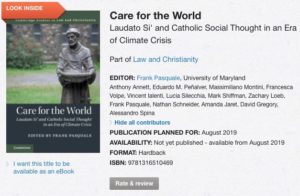I’ve just read a chapter from a forthcoming book that I think recommends itself as necessary reading for AIRE’s project partners and anyone working toward democratic energy, sustainable communities, and humanity’s common future. I don’t intend this to be a chapter review. Instead, I want to highlight some of the key ideas in it and begin working out some correlations in practical experience like our’s at AIRE.
Nathan Schneider (1), at the University of Colorado Boulder, has contributed an important chapter in the forthcoming book Care For the World: Laudato Si’ and Catholic Social Thought in an Era of Climate Crisis. The chapter is “Truly, Much Can Be Done!”: Cooperative Economics from the Book of Acts to Pope Francis. Following the long arc of cooperative history from early in the New Testament to the present day (Catholic, eccumenical, and secular), he rebutts the criticisms that some have leveled at the climate encyclical because, for the critics, it isn’t hopeful. Honesty about the moment of social and ecological peril we’re in now is essential though, and the pope is indeed very honest. But what Schneider rightly points out, as evidenced in the chapter’s title, is that Laudato Si’ is full of necessary candor but only as critique’s co-coordinate for change– POSSIBILITIES.

Writing that “It would take a bold feat of interpretation to understand ‘Truly, much can be done!’ as apocalyptic or foreboding” Schneider points to the pope’s source of possibility– “new forms of cooperation and community organization.” This is the important practical linkage with AIRE’s work in community-owned renewable energy.
The encyclical’s subtitle, “care for our common home” serves as a reminder that we’re all in this together. Our work presents several stories that exemplify what Schneider describes in his cooperative economics chapter. One in particular is the Ancilla Domini Sisters and their Poor Handmaids for Jesus Christ missions near South Bend, Indiana. Stories like Poor Handmaids may not be about formal cooperatives per se (yet) but they are about new forms of cooperation and community organization that are driven by values other than profit, grounded in integral ecology, and thus new mental models and ways to understand. In the span of a year, they will have over half a megawatt of solar on their campus. This is an inspiring accomplishment in these times.
So much has been made of Si’ Laudo (at least in some circles) that one might label Pope Francis’ commons and cooperative thoughts new and radical. However, Schneider points out that cooperation, defined as “the proper human posture toward God and creation” is a century-old feature of Catholic social thought. The supporting axioms of this cooperative “posture” are:
• distributed ownership (for us the essence of “community-owned renewable energy”)
• people over profit (again, for us, the goal of it)
One place this takes me is to the role of money, where Schneider, quoting from Pope Francis’ speech at the 2015 Confederation of Italian Cooperatives, writes:
“When money becomes an idol, it commands the choices of man. And then it destroys man and condemns him. It renders him a servant. Money at the service of life can be managed in a just way by a cooperative, if however, it is an authentic, true cooperative, where capital is not in command over men but men over capital.” (per Schneider, emphasis in original Vatican transcript)
Here again, we have seen groups following this. At the most significant scale in our experience is Poor Handmaids but there are others at smaller scale that are no less important in terms of their leadership and educational impact. We have also reviewed countless impact investor proposals for nonprofit solar projects that tip the scales, sometimes massively, in favor of their own profit. At a radically opposite end of the continuum are the investor-owned utilities (IOU) reaping obscene profits, paying no taxes year after year, and getting millions kicked back in tax breaks thanks to their monopoly status and the lobby-industrial-complex. Meantime, they’re greenwashing (i.e. telling lies about) their commitment to renewables while fleecing the public to lock in costly new fossil fuel generation. Somewhere in the middle, but with many drifting toward “false cooperatives” behaving more like IOUs, are the rural electric cooperatives.
Bringing these cooperative type experiments into being, no matter how difficult or risky, involves a particular kind of action. “Understanding” and “possibilities” are pedagogical for sure and cooperatives recognize this, from Mondragon and the others. But Schneider shares a recent experience he had after speaking at an event in Australia where an elderly man approached and began to speak. Only one word Schneider recalled– Formation. He continues, writing “The man’s name was Race Mathews. And despite his reference to a theological concept, he confessed to being neither a Catholic nor a believer.”(2) Schneider translates formation’s Catholic context and usage for us, which “refers to a Christian’s ongoing conversion to Christianity– through prayer, study, and experience.” I read this as the Catholic take on praxis that anyone can adapt. Like Race Mathews, one doesn’t have to belong to any particular faith tradition. Diverse things contribute to one’s formation and “conversion” is an enduring pursuit.
We aren’t to the place of a newly transformed, democratic distributed energy system yet but we have many pieces, experiments, and partly developed ideas to teach us. These can be among the diverse experiences that shift our mental models (3) and contribute to that energy system we hope to see fully develop in the coming decade. We don’t have a moment to waste.
Notes:
(1) Also see Schneider’s recent book on cooperatives here.
(2) Schneider mentions Race Mathews’ 2009 book “Jobs of Our Own” which delves into the history of cooperative economics.
(3) On the idea of design and mental models, see Escobar.